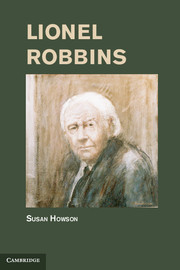Book contents
- Frontmatter
- Contents
- Illustrations
- Abbreviations
- Introduction
- One Father and Son
- Two The Great War
- Three Postwar
- Four The London School of Economics
- Five Iris Gardiner
- Six New College Oxford
- Seven The Young Professor
- Eight Fritz and Lionel
- Nine The School in the Mid-1930s
- Ten The Approach of War
- Eleven The Economics of War
- Twelve Director of the Economic Section
- Thirteen Anglo-American Conversations
- Fourteen The Law Mission and the Steering Committee
- Fifteen 1 9 4 4
- Sixteen The Last Months of the War
- Seventeen The Postwar Settlement
- Eighteen Return to the School
- Nineteen The End of the Transition
- Twenty LSE in the Early 1950s
- Twenty-One Chairman of the National Gallery
- Twenty-two Lord Robbins
- Twenty-three The Robbins Report
- Twenty-four The Sixties
- Twenty-five The Arts
- Twenty-six The Troubles at LSE
- Twenty-seven Retirement
- Conclusion
- Bibliography
- Index
Twenty-four - The Sixties
Published online by Cambridge University Press: 07 October 2011
- Frontmatter
- Contents
- Illustrations
- Abbreviations
- Introduction
- One Father and Son
- Two The Great War
- Three Postwar
- Four The London School of Economics
- Five Iris Gardiner
- Six New College Oxford
- Seven The Young Professor
- Eight Fritz and Lionel
- Nine The School in the Mid-1930s
- Ten The Approach of War
- Eleven The Economics of War
- Twelve Director of the Economic Section
- Thirteen Anglo-American Conversations
- Fourteen The Law Mission and the Steering Committee
- Fifteen 1 9 4 4
- Sixteen The Last Months of the War
- Seventeen The Postwar Settlement
- Eighteen Return to the School
- Nineteen The End of the Transition
- Twenty LSE in the Early 1950s
- Twenty-One Chairman of the National Gallery
- Twenty-two Lord Robbins
- Twenty-three The Robbins Report
- Twenty-four The Sixties
- Twenty-five The Arts
- Twenty-six The Troubles at LSE
- Twenty-seven Retirement
- Conclusion
- Bibliography
- Index
Summary
The chairmanship of the Financial Times gave Lionel Robbins an opportunity to participate in business rather than just comment on it as an economist. He found for a while that he enjoyed it. ‘My business preoccupations grow more & more complicated’, he told Caroline on 2 June 1967, ‘but they are not interesting to those not immediately concerned. I enjoy the life; and although it restricts the time available for reading & writing, I am always thankful that after a long life in which I have thought & taught about society & its business from an academic point of view, I have actually been able to participate at a high level in the practical side of things. It has meant a new world of friends too.’ This chapter discusses Robbins’s work for the FT and its related companies – but only those aspects he thought interesting enough to mention to his sister – as well as his remaining academic activities in the 1960s. He had other commitments, especially in the arts. I turn to these in the next chapter.
In January 1961 Robbins expected to spend all day on Tuesdays at Bracken House and at least another three or four hours each week there (LCR to Adam Maitland, 20 December 1960, General Correspondence September 1959-May 1960, RP). He lectured at LSE on Monday mornings, lunching in the Senior Common Room and holding his seminar, jointly with Phillips, in the afternoon, followed, while he was head of the department, by his Economics Department tea. In 1960/1 he was also lecturing on Wednesday mornings but for the next two years he lectured only on Mondays at noon on the history of economic thought (LSE Calendars). Wednesday afternoons were devoted to School meetings. The BP and National Gallery boards met on Thursday afternoons: when they clashed the latter often won; Robbins also missed several BP board meetings because of the overseas visits of the Higher Education Committee. The ROH board, to which Drogheda and Robbins could proceed together from Bracken House, met at 4 p.m. on Tuesdays. Its ballet subcommittee also usually met on Tuesdays at 4. The dates and times of the finance subcommittee were variable but usually held in the late afternoon, mostly on Thursdays. Otherwise Thursdays could be available for FT business.
- Type
- Chapter
- Information
- Lionel Robbins , pp. 897 - 940Publisher: Cambridge University PressPrint publication year: 2011

